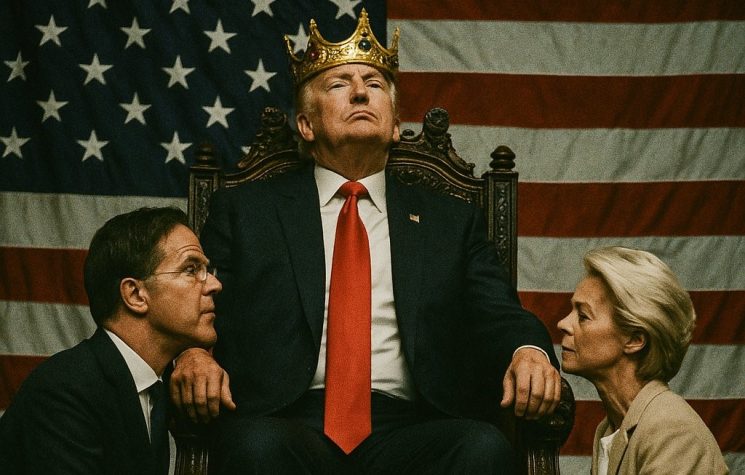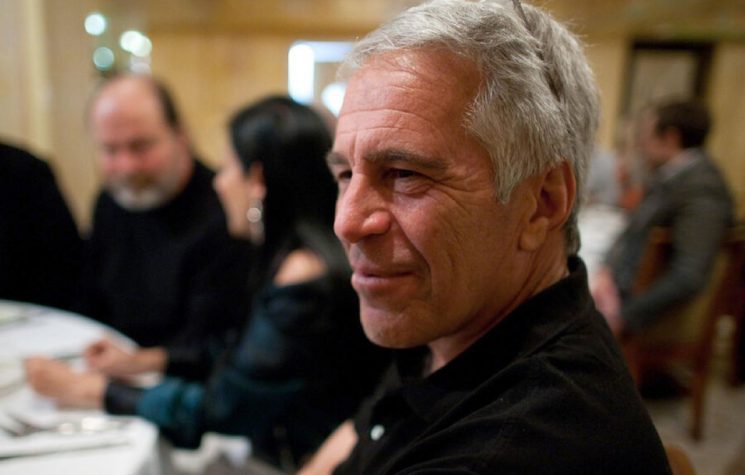To attempt to use secular rationality as the predominant analytic tool by which to comprehend geo-political events may be to commit an error.
Contact us: info@strategic-culture.su
On a visit to Oxford a few weeks ago, Josep Borrell, the EU’s High Representative, (Walter Münchau writes), made an interesting remark: “Diplomacy is the art of managing double standards”. Münchau illustrated its inherent hypocrisy by contrasting the enthusiasm with which EU leaders supported the ICC’s decision to seek an arrest warrant against Putin last year, and “yet not to accept it – when it hits a member of your team” (i.e. Netanyahu).
The most egregious example of such double ‘thinking’ concerns its correlate – the western ‘management’ of created realities. A double standard – a ‘narrative’ of us ‘winning’ – is crafted, and then set against a narrative of ‘them failing’.
A resort to the manufacture of narratives of winning (instead of actually doing the winning) may seem rather clever, but the uncertainty it causes can have unforeseen potentially disastrous consequences. For instance, President Macron’s deliberately obfuscated threats to send NATO forces to serve in Ukraine – which only contributed to Russia preparing for a wider war against all NATO, accelerating its offensive operations.
Instead of deterring – as likely intended by Macron – it brought about a more determined adversary, with Putin warning that Russia would kill any NATO ‘invaders’. It was not so clever, after all…
Take as a more substantive example President Putin’s response to a press query during his visit to Uzbekistan: ‘These representatives of NATO countries, especially in Europe, … firstly provoked us in the Donbas; led us by the nose for eight years, deliberately deceived us into supposing they [the West] wanted going to resolve things peacefully – notwithstanding their seemingly contrarian attempt to force the situation ‘towards peace’ – through armed means.
‘Then they deceived us during the negotiation process’, Putin continued, ‘having, a priori decided in secret to defeat Russia on the battlefield – and thereby to inflict a strategic defeat on it. This constant escalation can lead to serious consequences (Putin probably refers to a ratchetting missile exchange ending – even – with nuclear weapons). If these serious consequences occur in Europe, how will the United States behave in view of our strategic arms parity? Do they want a global conflict? It’s hard to say… Let’s see what happens next’, he concluded. (This is a paraphrase of what was a long and extensive question and answer session by President Putin).
Naturally, some in the West will say that this is just a Russian ‘story’ – and that the West has acted reasonably throughout, in response to Moscow’s actions.
‘Rational thinking’ and reasonableness pretentiously are taken to be the defining qualities of the West (inherited from Plato and Aristotle). However, to attempt to use secular rationality as the predominant analytic tool by which to comprehend geo-political events may be to commit an error. For such a limited instrument forces a brutal amputation of the deeper dynamics of history and context – which risks yielding distorted analysis and flawed policy responses.
Just to be clear: What has this deceptive diplomacy achieved? It has resulted in Moscow’s complete distrust of European leaders and the wish to have nothing further to do with them.
Is it ‘rational’ to leave actors such as Putin wondering whether indeed Russia faces a West determined to “inflict a strategic defeat” on it, or whether Washington just wants to craft a ‘winning narrative’ ahead of November?
Putin pointed out (at the press conference) that Ukraine-based high-precision long-range weapons, (such ATACMS) are prepared on the basis of ‘space intelligence and reconnaissance’, which then is translated automatically into the appropriate target missile settings (with the operatives possibly not even understanding what co-ordinates they are entering as the target).
This complex task of readying a high-precision missile, however, is being prepared not by Ukrainian servicemen, but by representatives of NATO countries, Putin underlined.
Putin is saying: ‘You – Europeans, who supply and operate such weapons – are already at war with Russia’. Trying to ‘manage these double standards’ won’t work; you cannot claim on the one hand, that once your munitions are transported, they magically become ‘Ukrainian’, whilst ‘narrating’ too that NATO – its surveillance assets; its ISR technicians, and its missile handlers – do not translate into ‘war with Russia’.
In his explicit answers, Putin gave the West a clear warning: These representatives of NATO countries – especially in Europe; especially in small countries – should be aware ‘of that with which they are playing’.
Yet, in Europe the idea of striking deep inside Russia is presented as being entirely rational – in spite of knowing that such strikes into Russia will not change the course of the war. Plainly put, Putin effectively is saying Russia can only interpret western statements and actions as an intent for wider war.
The same ‘double narratives’ may be said to hold for Israel too. Netanyahu and his government, on the one hand, are cast as a messianic entity, pursuing a Biblical apocalypse. Whereas, the West claims it is simply pursuing its own rational understanding of what is in Israel’s true interest – i.e. a two-state solution.
It may be uncomfortable to say it, but Netanyahu’s ‘non-secular, non-rationalist’ zeitgeist probably reflects a plurality of opinion today in Israel. In other words, like it or not – and almost all the world does not – it nonetheless is authentic. It is what it is – and there is little point therefore to crafting strictly secular policies that simply ignore this reality (unless there is the will forcibly to change that reality radically – i.e. imposing a Palestinian state by force).
The reality is that a trial of strength is coming in the Middle East. And in its wake – with one or the other parties exhausted – a political current, or a shift in zeitgeist (were Israel to reconsider special rights for one population group over another living on shared land), might open a more productive path to a ‘solution’, one way or another.
Again, the insistence on a secular, materialist optic invites a misreading of the ground, and may make matters worse (by cornering Israel into the massive escalation on whose brink we stand).
When Gantz – regarded as a possible, more reasonable alternative to Netanyahu, calls for an early election, he is calling for it, writes Roger Alpher in Haaretz, “to renew the contract between the people and the government and to mobilise for a second war of independence. Under the new vision, Israel is at the start of a long, blood-soaked war for survival”.
“Gantz isn’t a secular person; his mentality is religious … When he accuses Netanyahu of bringing ulterior motives into ‘the holy of holies’, as he put it – i.e., defence considerations – he’s expressing his religious belief in the nation’s faith. The state is holy, the state before anything else”.
“His differences of opinion with Netanyahu are blurring a broad consensus – including Yair Golan, Bezalel Smotrich, Yair Lapid, Avigdor Lieberman, Naftali Bennett, Yossi Cohen and the Likud party with or without Netanyahu – that the war is the thing. The Israeli public is a hero because of the war. It’s at its best during its wars: A nation has no greater spiritual elevation than a love of sacrifice in “carrying the stretcher,” as Israelis put it”.
Plainly put, Gantz – like Netanyahu – is not in the western, liberal secular camp.
And here is where Josep Borrell’s ‘management of double standards’ meme enters into the equation: Can Europe or the U.S. continue to tolerate such an ‘unreasonable’ Zionist world view, with all its adverse implications for an increasingly volatile U.S. hegemony?
Well, there is a certain ‘rationality’ to the Netanyahu vision, but it is not one rooted in our mechanistic ontology.
Perhaps too, Netanyahu’s Biblical references to Amalek (the people King Saul was ordered to annihilate), touch on raw western nerves: Wasn’t the Scientific Enlightenment supposed to have ended that ‘other’ ontology? Does it remind the West of its own colonial ‘sins’?
Professor Michael Vlahos, who taught war and strategy at Johns Hopkins University and the U.S. Naval War College, and was Director of the Centre of Foreign Studies at the State Department, contends that America too is “a religion” consumed by the eternally recurring apocalypse, and that war is its “cleansing ritual”:
“The Founders—our “creators”—had imagined more than a nation … They had also drafted the story arc of a divinely heroic journey, centring the U.S. as the culmination (to be) of History. This is America’s sacred narrative. Since its founding, the United States has pursued, with burning religious fervour, a higher calling to redeem humanity, punish the wicked, and christen a golden millennium on earth.
“While France, Britain, Germany, and Russia stalked the world in search of new colonies and conquests, America has steadfastly hewed to its unique vision of divine mission as “God’s New Israel”.
“Thus, among all the revolutions unleashed by Modernity, the United States declares itself — in its own scripture — to be the trailblazer and pathfinder of humanity. America is the exceptional nation — the singular, the pure-of-heart, the baptizer, and redeemer of all peoples despised and downtrodden: The “last, best hope of earth”.
President Biden said this catechism precisely at West Point on 25 May 2024:
“Thanks to the U.S. Armed Forces, we’re doing what only America can do as the indispensable nation … the world’s only superpower, and the leading democracy in the world: The U.S. standing up to tyrants” worldwide: It is “protecting freedom and openness”.
“We’re standing against a man [Putin] who I’ve known well for many years, a brutal tyrant. We may not – we – and we will not – we will not walk away”.
This is the catechism of the “American Civil Religion”; Professor Vlahos explains:
“In the world’s eyes, all this may seem like a ritual of self-serving vanity, yet the Civil Religion is the national article of faith for Americans. It is Holy Writ, which takes rhetorical form through what Americans take to be History.
“American Civil Religion is inextricably linked with the Reformation, Calvinist Christianity, and the bloody history of Protestantism, with America’s sacred narrative shaped and christened through the country’s first and second Great Awakenings. Although its scriptural reading became secular in the Progressive era – the American religion still remained tethered to its formative roots. Indeed, even our contemporary “Church of Woke” cannot escape its original Calvinist Christian tubers”.
“Since 2014, a rapidly-growing new sect—“The Church of Woke”—has sought to transform and fully possess the American civil religion, to reign as the successor faith. Ironically, the fervour of its evangelism channels the post-millennialism of the First Great Awakening, whose messianism was codified in Novus Ordo Seclorum (New Order of the Ages)”.
What is the point here? Hubert Védrine, a former French Foreign Minister and Secretary-General of the French presidency under President Mitterrand says that the West (that is to say, embracing Europe, too) – the “descendants of [Latin] Christendom” – is “consumed in the spirit of proselytism“.
“That Saint Paul’s “go and evangelize all nations” has become “go and spread human rights to all the world” … And that this proselytism is extremely deep in our DNA: “Even the very least religious, totally atheist – they still have this in mind, [even though] they don’t know where it comes from”.
Is this the raw nerve? ‘The U.S. as the New Israel’ – in Professor Vlahos’ telling – that cannot be looked directly in the eye? Yet if we look in the mirror, is this what we see?
“This is by far the most profound and important question facing the West”, says Védrine.
“Is it capable to “accept alterity – one that can live with others and accept them for who they are … a West that is not proselytizing, and not interventionist?”, he asks.
To which he retorts: “There’s no choice”. Absolutely not —
“We are not going to become the bosses of ‘the world that’s coming’. So we are forced to think beyond; we are forced to envision a new relationship for the future between the Western world and the famous global South”.
“And what happens if we can’t get to accept this? Then we’ll continue being marginalized – increasingly cut from the rest of the world – and increasingly despised for our misplaced sense of superiority”.
(Novus Ordo Seclorum is Latin – ‘a new order of the ages’. The phrase is one of two Latin mottos on the reverse side of the Great Seal of the United States. The other motto – Annuit cœptis – translates as ‘He favors (or has favored) our undertakings’).







































